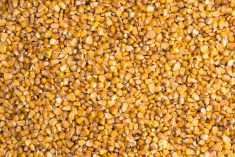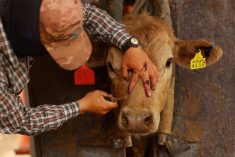Reforms agreed by European Union negotiators on Wednesday offer subsidies to keep farms producing in regions where conditions are hard, going against the bloc’s shift towards relying on market forces in agriculture.
Since 1992, the EU has been altering its common agricultural policy (CAP) to encourage farmers to grow crops in response to market prices, not subsidies. The aim was to avoid the butter mountains and wine lakes seen in the 1980s, when farmers were paid to produce even when markets were satiated.
“The current reform is quite a break from that,” said Alan Matthews, professor emeritus of European agricultural policy at Trinity College, Dublin, noting a shift toward linking payments more closely to production — a practice known as “coupling.”
Read Also

U.S. grains: Wheat futures rise on supply snags in top-exporter Russia
U.S. wheat futures closed higher on Thursday on concerns over the limited availability of supplies for export in Russia, analysts said.
EU negotiators said they agreed sweeping changes to the bloc’s farm policy on Wednesday, fixing the rules governing 50 billion euros (US$65 billion) in annual farm subsidies for 2014-2020.
The package includes liberalizing sugar production from 2017 and cutting subsidies to the largest farms in the bloc.
But it also lets some countries link direct subsidies to output levels in certain regions, to help maintain output where farmers face natural or other constraints, such as dairy farms in mountainous central France.
Analysts said the latest reforms link a limited share of payments more closely with production in part to maintain agriculture in more areas.
Under the complex new rules, for some member states up to 15 per cent of payments may be coupled but for others it may be only eight per cent.
“This is not something that’s going to increase production. This is something designed to maintain existing production in areas where it would otherwise disappear,” said European Commission agriculture spokesman Roger Waite.
Big is beautiful
Some were critical of EU moves to protect small, struggling producers.
Independent consultant Sean Rickard said there was a need to invest heavily in new technologies to drive the growth in production needed as global demand expands.
“You can’t do that with farmers hanging on by their fingertips,” said Rickard, a former chief economist for Britain’s National Farmers Union and a UK government advisor.
“The future lies with large-scale efficient farms.”
Others, however, stressed the value of farming in preserving the beauty of the countryside.
“Imagine the countryside without farmers, it’s something else entirely. The diversity of landscapes is precisely part of Europe’s charm,” said Philippe Chalmin, economist at Paris Dauphine university and a commodities specialist.
The EU is asking farmers to justify subsidies by linking part of their payments to the adoption of measures designed to improve the environment, such as ecological focus areas where wildlife can thrive.
“Moving from payouts based on production to flat payments turns farmers into welfare recipients with tractors,” said Simon Evenett, professor of international trade and economic development at the University of St. Gallen.
“At a time when budgets are tight, no special interest group wants to be seen getting something for nothing,” he added.
“Logic of liberalism did not win”
Britain, a strong proponent of liberalizing EU farm policy, had reservations about some of the latest reform proposals, while France has sought more protection for farmers and saw it as a victory.
Noting that global talks meant to liberalize trade have been an important driver for market forces, Britain’s agriculture minister Owen Paterson regretted that none were now under way.
“It was unfortunate there were no (global) trade talks to keep the pressure on,” Paterson said.
The World Trade Organization’s Doha round ground to a halt in 2008 amid disagreements over farm subsidies, tariffs and market access. An impasse was formally declared in 2011.
“The logic of liberalism did not win, on the contrary we managed to turn the situation around…we didn’t let things slide, we changed what has been the prevailing trend in agriculture,” French farm minister Stephane Le Foll said.
The current reform package does contain elements which point to more open markets such as the abolition of sugar quotas in 2017. The basic principle had, however, been agreed years ago and the latest reform delays implementation by two years.
The EU’s acknowledgement in these reforms that its farmers need protection from the market may also encourage other governments around the world who prop up unprofitable producers.
In China, for example, sugar production continues to be heavily subsidized, exacerbating a global glut of the sweetener.
“It’s a negative signal to the rest of the world,” Trinity College’s Matthews said.
— Nigel Hunt is a Reuters correspondent based in London, England. Additional reporting for Reuters by Gus Trompiz in Paris.


















